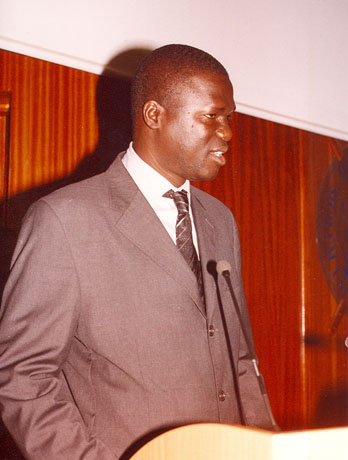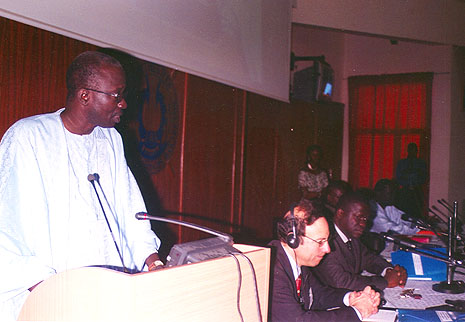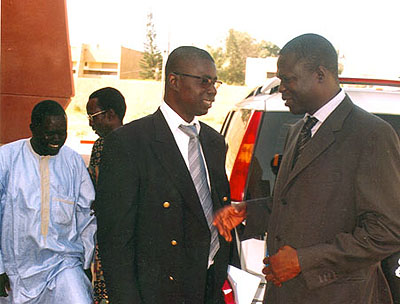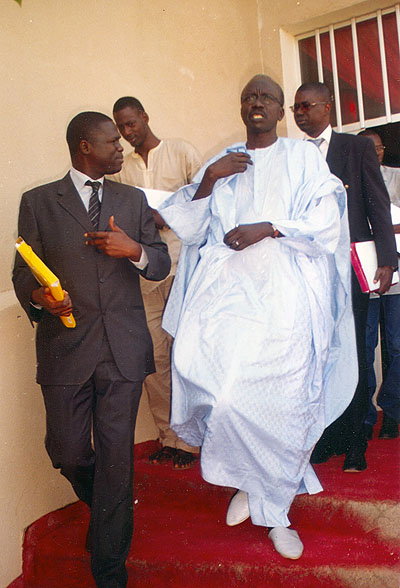











SAGA
B16 MVR Hall
Ithaca, NY 14853
(607) 255-8931
Fax (607) 255-0178
saga@cornell.edu
|
|
Cornell University ♦ CREA ♦ Ministère de l’Education du Sénégal
Regional Conference on “EDUCATION IN WEST AFRICA: CONSTRAINTS AND OPPORTUNITIES”
November 1-2, 2005
Dakar, Senegal
On Tuesday, November 1, and Wednesday, November 2, 2005, the SAGA team in Dakar, in partnership with Cornell University, CREA, and the Ministry of Education held a major international conference on Education in West Africa: Constraints and Opportunities. The event took place in the Grand Amphithéâtre de L’UCAD II, at Cheikh Anta DIOP University. It was opened by Honorable Moustapha Sourang, Senegalese Minister of Education, Mr. Mbaye Ndoumbé Guèye, Director of Planning and Reform at the Ministry of Education, Pape Guèye, Special Advisor to the Minister of Education, Professor Abdou Salam Sall, the Rector of the University, and Professor Mohamed El Bachir Wade, the Dean of the Faculty of Economics and Management.
More than one hundred attended, including several academics from the University of Dakar and other African and European universities as well as from the Dakar Campus of Suffolk University; experts from the Senegalese Ministries of Education, Adult Literacy and Vocational Training; representatives of donors (USAID, IDRC/SISERA, UNICEF, Agence Française de Développement); and many NGOs and education-oriented associations such as Pôle de Dakar and Aide et Action, among others

Professor Aly Mbaye, Director of CREA | | The education system in most countries in West Africa is facing monumental
challenges. Reflecting resource inefficiencies and misallocations in the composition of
public spending across educational levels, and poor quality of schooling from elementary
to higher education, gross enrollment rates both at the primary and secondary levels are
low, even when compared with the averages for Sub Saharan Africa. Grade repetition
and dropping out of primary school before completion are serious problems. Few
children proceed to lower secondary school. For those who do make it to secondary
school, repetition continues to be a problem. |
|
Girls are at a particular disadvantage. Across
all grades, repetition and dropout rates are systematically higher for girls than for boys. Among children that do progress through schools, there is considerable concern
about the extent of learning and cognitive outcomes.
| |

From left to right, Mr. Moustapha Sourang, Minister of Education; Prof. David Sahn, Cornell University; Prof. Aly Mbaye, Director of CREA; Prof. Abdou Salam Sall, Rector of l’Université Cheikh Anta Diop De Dakar; Prof. Bachir Wade, Dean of the Faculté of Economics and Management (FASEG). |
Issues of quality of teachers,
characteristics of school infrastructure, supplies and equipment, the home environment
and parental background, all represent concerns over the value added of going to school,
and may depress demand among parents.
Clearly, the ability of countries to increase human capital, which is essential for
development, has been seriously compromised by the weakness of education systems.
Governments confront numerous challenges in their efforts to increase the access to basic
education, to improve education quality, and to increase the efficiency of the
management of the educational system. For each of these policy objectives, research is
needed to understand the factors at different levels—household, school, and
community—that affect education outcomes, and particularly for primary and lower
secondary school.
View AGENDA for conference. (PDF)
 | | In foreground, left to right, Prof. Abdou Salam Sall and Prof. Aly Mbaye; in background,
M Pape Gueye, Conseiller du Ministre de l’éducation and
Prof. Bachir Wade (FASEG)
|
CONFERENCE PRESENTATIONS AVAILABLE ON-LINE
Session 1
Plenary Session:
L’analyse de l’accès à l’éducation au Sénégal: application de la méthode CART (Classification and regression
trees)
by Aly Mbaye, Director, CREA/UCAD; Dominique Haughton, Bentley College, Boston; and Abou Kane, CREA/UCAD
(Download Powerpoint file)

From left to right, Prof. Aly Mbaye and Monsieur Moustapha Sourang, Pr. Abdou Salam Sall. |
Panel A: Access/Quality
Impact de la pauvreté sur la scolarisation et le travail des enfants de 6-14
ans au Togo
by Vissého Adjiwanou, Centre d’Etudes et de Recherches sur le Développement International (CERDI) and Université de Lomé
(PDF)
L’augmentation des budgets suffit-elle à la qualité des systèmes éducatifs? Cas du Gabon
by Jean Rémy Oyaya, Université Omar Bongo Odimba de Libreville
(PDF)
Improving Schools in a Context of Decentralization: Findings from Research in West
Africa – Benin, Guinea, Mali and Senegal
by A. De Grauwe et C. Lugaz (IIEP); D. Odushina and M. Moustapha (Bénin) ; D. Baldé
(Guinée) ; D. Dougnon (Mali); and C. Diakhaté (Sénégal)
(PDF)
Income Risk and School Decisions in Burkina Faso
by Harounan Kazianga, Earth Institute, Columbia University
(PDF)
Analyse critique des normes EFA-FT de production de service
éducatif dans l’enseignement primaire des pays de l’UEMOA
by Célestin Venant C. Quenum, Université de Bourgogne, Pôle AAFE, IREDU
(PDF)
Optimiser la participation communautaire au financement et à
l’accroissement de l’offre éducative
by Servais Edoh Wallace, Aide et Action Togo
(PDF)
Les ménages maliens face à l’éducation: les contraintes d’une scolarisation
by Abdramane Traoré, Université de Bamako, Mali
(PDF)
Session II
Plenary Session:
Cognitive Skills among Children in Senegal: Disentangling the Roles of Schooling and Family Background
by David Sahn and Peter Glick, Cornell University
(PDF)
Panel B: Efficiency/Equity
Améliorer l’efficacité du système éducatif en Afrique
by Alioune Ndiaye, Aide et Action Afrique, Sénégal
(Download Powerpoint file)
La dimension économique de l’efficacité externe de l’éducation en
Afrique de l’Ouest
by Elsa Duret, Pôle de Dakar (UNESCO-BREDA / France-MAE), Sénégal; Mathias Kuepie, DIAL, CEPS/INSTEAD; Christophe Nordman, DIAL, IRD-Paris; and François Roubaud, DIAL, IRD-Paris
(PDF)
Les dépenses publiques d’éducation sont elles pro
pauvres? Analyse et Application au cas du Sénégal
by Birahim Bouna Niang, CREA
(PDF)
Economic Analysis of Private Returns to Investment in Education in Cameroon
by Aloysius Ajab Amin and Wilfred J. Awung, African Institute for Economic Development and Planning (IDEP), Sénégal
(PDF)
L’impact des niveaux de qualification de la main d’oeuvre sur la productivité des enterprises: analyse appliquée au secteur industriel sénégalais
by Abdoul Alpha Dia, IREDU (CNRS, Université de Bourgogne)
(PDF)
Causes of low academic performance of primary school pupils in the Shama Sub-Metro of
Shama Ahanta East Metropolitan Assembly (SAEMA) in Ghana
by Kafui Etsey, University of Cape Coast, Ghana
(PDF)
Education et développement humain en Afrique de l’Ouest: des hauts et des bas. Les cas du Burkina-Faso, de la Côte d’Ivoire et
du Sénégal
by Jean Claude Saha, Université de N’Gaoundéré
(PDF)
Other Conference Papers:
Public Education Expenditure and Defence Spending in
Nigeria: An Empirical Investigation
by Michael Adebayo Adebiyi, and Oderinde Oladele, University of Lagos, Nigeria
(PDF)
Long Run Relationship between Education and Economic
Growth in Nigeria: Evidence from the Johansen’s
Cointegration Approach
by Musibau Adetunji Babatunde, University of Ibadan, Nigeria; and Rasak Adetunji Adefabi, Oyo State College of Education, Nigeria
(PDF)
Education, Allocation, Unemployment and Economy Growth in Nigeria: 1970-2004
by J. O. Ajetomobi, Ladoke Akintola
University of Technology, Ogbomosho, Nigeria; and A. B. Ayanwale, Obafemi Awolowo University, Ile Ife, Nigeria
(PDF)
Strategies to Reduce Repetition in Cameroon Primary Schools
by George Fonkeng, The University of Yaounde I, Cameroon
(PDF)
Household Level Social Capital and Children’s Schooling Decision in
Cameroon: A Gender Analysis
by Tabi Atemnkeng Johannes, University of Dschang, Cameroon
(PDF)
Earning and Learning in the Rural Area of Sub-Saharan Africa: An Inquiry into the Cocoa Sector
by Guy Blaise Nkamleu, International Institute of Tropical Agriculture, Ibadan, Nigeria
(PDF)
Child Schooling in Nigeria: The Role of Gender in Urban, Rural, North
and South Nigeria
by Benjamin Chiedozie Okpukpara and Nnaemeka A. Chukwuone, Center for Rural Development and Cooperatives, University of Nigeria,
Nsukka
(PDF)
Do Mothers’ Educational Levels Matter in Child Malnutrition and Health Outcomes in Gambia and Niger?
by A. S. Oyekale and T.O. Oyekale, University of Ibadan,
Nigeria
(PDF)
Primary School Enrollment and Gender Gap of Rural Households’ Children in South Western Nigeria
by M. A. Y. Rahji, University of Ibadan, Nigeria
(PDF)
Corruption, Croissance et Capital Humain: Quels Rapports
by Pierre Roche Seka, Université de Cocody
(PDF)
|
|
HOME | RESEARCH |
PUBLICATIONS |
TECHNICAL ASSISTANCE |
CONFERENCES |
GRANTS |
PARTNERS |
PROJECT PERSONNEL |
PROGRESS REPORTS |
LINKS |
CONTACT US | SEARCH
© 2017, 2016–2004 SAGA
|
|